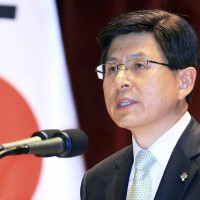South Korea’s Prime Minister Hwang Kyo-ahn has announced that the government will publish history textbooks for use in schools from 2017; a step seen as necessary to strip current teaching of its “ideological bias”.

According to Hwang Kyo-ahn, textbooks should be true to South Korea’s constitutional values
The move, which will end a four year implementation of textbooks written by private-sector scholars and issued by private publishers, has capped weeks of debate about whether it was democratic for the government to dictate how the country’s turbulent modern history is taught.
“It is realistically impossible to author a correct history textbook under the current system. It is the government’s conclusion that the privately-authored system has failed,” Hwang said during a joint press conference with Education Minister Hwang Woo-yea at the Seoul Government Complex. “We need to make a textbook based on objective facts, and true to constitutional values.”
He said that current history circles were dominated by left-leaning scholars, and private publication could only create textbooks that were favourable to the leftists and North Korea.
The decision added fuel to the widespread protests nationwide led by the progressives, students, teachers and scholars, who have denounced the government decision as being unilateral with some suggesting it was politically motivated to glorify the past dictatorships.
The main opposition New Politics Alliance for Democracy boycotted the plenary session of the National Assembly to protest the government’s decision.
NPAD chief Rep. Moon Jae-in said the government “trampled the dominant public sentiment” against the state textbooks. “Ignoring the majority and pushing ahead with an illegal system, isn’t that dictatorship?” he said.
But Rep. Kim Moo-sung, chief of the ruling Saenuri Party, bashed the NPAD for boycotting the session and said, “Dragging the textbook issue into a political standoff while people’s livelihoods are at stake is just not right.”
Korea currently allows eight private publishers to author textbooks, and authorizes them for use. The system was implemented for Korea’s modern history lessons in 2002, and expanded to encompass the entire secondary history education system in 2011.
The specifics of the state textbooks will be unveiled at Wednesday’s briefing by the National Institution of Korean History, which will oversee its publication process.








